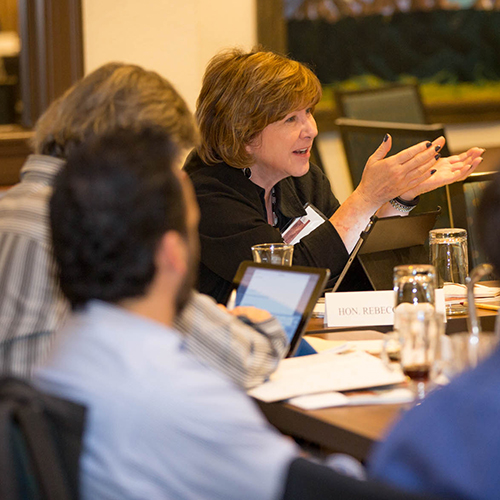Ten Years of IAALS: Building Foundations for Better Law Student Outcomes
IAALS is celebrating its 10th Anniversary in 2016. Throughout the year, we will be featuring guest posts from our colleagues and partners to recap our accomplishments and national impact—and look to the future ahead. The full series of posts will be collected here.
 Figuring out how to educate law students to meet the needs of modern law practice is vitally important given shrinking job markets and changing demands on lawyers. IAALS has accepted that challenge with its Educating Tomorrow’s Lawyers (ETL) initiative, which focuses on preparing new lawyers for successful participation in the legal profession.
Figuring out how to educate law students to meet the needs of modern law practice is vitally important given shrinking job markets and changing demands on lawyers. IAALS has accepted that challenge with its Educating Tomorrow’s Lawyers (ETL) initiative, which focuses on preparing new lawyers for successful participation in the legal profession.
Law schools have traditionally focused on applicants’ LSAT scores and grade point averages to determine admissions to law schools. This produces a student body designed to perform well on standardized tests and in college-type settings. But lawyers nowadays must not only be smart in the academic sense and perform well on written tests, they must know how to understand, research, and effectively analyze legal problems. In addition, they must know how to relate to clients and use technology to serve their clients’ needs, among other skills.
What else must lawyers know and be and do to succeed in today’s legal market? ETL has undertaken to find out. It has questioned lawyers and judges to secure empirical data on the characteristics important for success. Recently acquired data show that—in addition to analytical, writing, and reasoning skills—responders value characteristics such as initiative, leadership, professionalism/courtesy, grit, time management, creativity, and innovation, as well as the ability to communicate, work in teams, and build relationships. These are not attributes that law schools screen for or ones they necessarily foster and develop, instead focusing on independent work and doctrinal learning, embellished with some legal writing and clinical offerings.
So how will we discover what skills and attributes modern lawyers need, and how will we learn to train law students so that they possess these attributes upon graduation? ETL is convening meetings and conducting research that examines the changing job market, profession, and demands on lawyers. Its research focuses on outcomes, re-examining and challenging long-held beliefs and understandings. It is reviewing the outcomes of innovative programs featuring more online education, mentoring, apprenticeships, externships, clinics, outreach, and cross-training, as well as other creative methodologies. With the data derived from this research, ETL convenes meetings and conferences to share ideas and information about what works. Does more experience with technology and more writing and clinical experience produce a better prepared lawyer? What is the role of multiple assessments of outcomes, and how should these assessments be done—and by whom?
Few schools have the ability, resources, or will to undertake this type of research. But it is vital if we are to understand the needs of the legal profession and find ways to ensure that tomorrow’s lawyers receive a legal education that prepares them to participate fully and successfully as members of the legal profession. I appreciate IAALS’ willingness to assist law schools, the legal profession, and the public by the work done through its ETL initiative.
I write this post in my personal capacity and as a member of the Foundations for Practice Advisory Committee. Although I am a former practitioner, judge (Chief Justice, Arizona Supreme Court, ret.), legal educator (Arizona State University Sandra Day O’Connor College of Law), and bar examiner (NCBE Board Member), and the current chair of the Council of the ABA Section of Legal Education and Admissions to the Bar, I do not write on behalf of any of these organizations.


